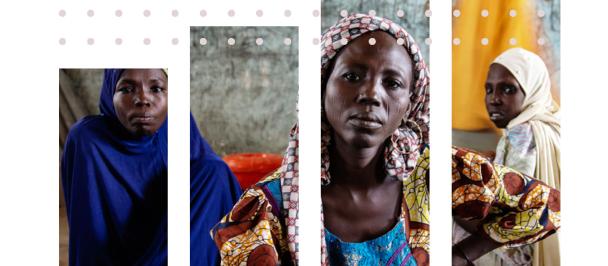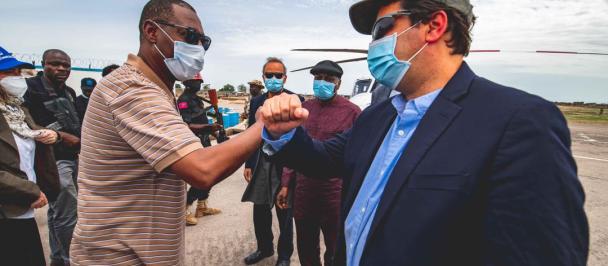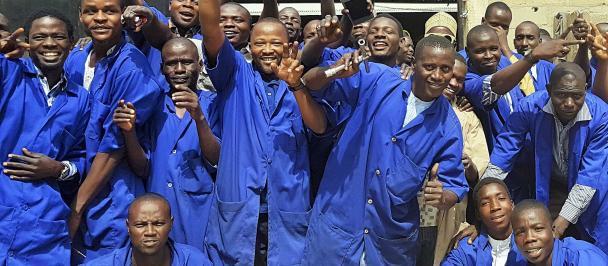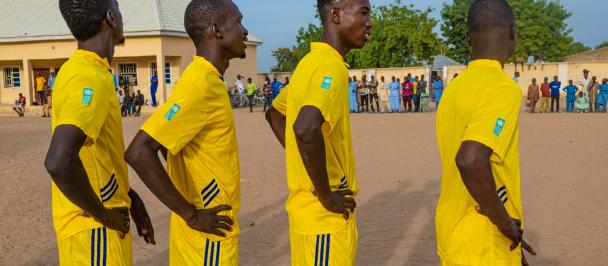In Banki, mission delegates visited and met with key partners and beneficiaries from the Federal Government and the UNDP Regional Stabilization facility
7 October, Maiduguri – Rehabilitated infrastructure, such as the Customs and Immigration Office, as well as reconstructed police station and barracks, on the border between Nigeria’s town of Banki in Borno State and the town of Amchidé in Cameroon’s Far North province, were officially opened today and handed over to the community.
The key infrastructure were inaugurated by the Executive Governor of Borno State, H.E. Prof. Babagana Umara Zulum, and the United Nations Assistant-Secretary General and United Nations Development Programme (UNDP) Assistant Administrator and Regional Bureau for Africa Director, Ms. Ahunna Eziakonwa, the Director General for Africa at the German Ministry of Foreign Affairs, Ms. Heike Thiele, and Norway Ambassador to Nigeria, Mr. Lein Eliiv.
L-R: The United Nations Assistant-Secretary General and United Nations Development Programme (UNDP) Assistant Administrator and Regional Bureau for Africa Director, Ms. Ahunna Eziakonwa and Executive Governor of Borno State, H.E. Prof. Babagana Umara Zulum
These were built through the Regional Stabilization Facility (RSF), led by the Nigerian Federal Government, with support from the UNDP and donor countries, such as Germany, the EU, Sweden, the UK and the Netherlands. High-level delegates of the visit included the United Nations Resident Coordinator and Humanitarian Coordinator to Nigeria, Mr. Edward Kallon, and the UNDP Nigeria Resident Representative, Mr. Mohamad Yahya.
“The facilities opened today will allow people in Borno State to re-start cross-border trade between Nigeria and Cameroon and to feel safer when doing so. It will also further enhance our effort towards the restoration of civil authorities in communities and villages around borders” explained H.E. Prof. Babagana Umara Zulum. “Through the Regional Stabilization Facility approach, we are looking at long-term changes. When we build a school, it will remain for the next twenty to twenty-five years, and we can see that the number of attacks have reduced in areas where we have implemented stabilization interventions.”
In Banki, mission delegates visited and met with key partners and beneficiaries from the Federal Government and the UNDP RSF, which uses a community-level approach to enhance physical security and access to justice, rehabilitate essential infrastructure and basic service delivery as well as revitalize the local economy to help communities recovering from conflict build back better.
The high-level delegation also met with Banki community members to get a deep understanding of priority needs, the key challenges they continue to face as well as their perspectives on current support from development partners.
“Empowering local actors to work together is essential to reach our common goal to foster sustainable peace and development for communities in north-east Nigeria,” stressed Ms. Eziakonwa. “Obtaining the right balance through the humanitarian-development nexus requires the scaling and speeding up of development efforts. The Regional Stabilization Facility projects we are seeing at the border here in Banki, have enabled communities to restart economic and trade activities, thereby improving conditions and reducing needs.”
The reopening of the border and key security infrastructure will aid in the return of local authority institutions, helping to facilitate rule of law and security, as well as contribute to the strengthening of the economy through cross-border trade and movement.
“We have witnessed good progress towards stabilization today", said Mrs Heike Thiele, Director for Stabilization at the German Federal Foreign Office. “The interventions under the Regional Stabilization Facility have not only contributed to the restoration of safety but have also helped strengthen the economy by enabling cross-border trade and movement”.
“This visit has given us the opportunity to engage with political leaders and people living in the insurgency affected border regions of Nigeria and Cameroon”, said Ambassador Knut Lein Eiliv. “I have appreciated seeing the developments being carried out under local leadership, and in partnership with highly qualified partners in the UN system. Norway will continue to support the work.”
The violence in northeastern Nigeria has driven more than two million people from their homes, halted livelihood opportunities and has erased access to basic services, like healthcare and education. With the death of Boko Haram leader Abubakar Shekau earlier this year, the mass surrender of insurgents and as the numbers of those in need continue to grow in the region, a potential tipping point in the crisis has emerged.
Ms. Ahunna Eziakonwa, The United Nations Assistant-Secretary General and United Nations Development Programme (UNDP) Assistant Administrator and Regional Bureau for Africa Director
The UNDP Regional Bureau for Africa Director, Ms. Ahunna Eziakonwa, arrived today in Borno State, after visiting Yaounde and Maroua in Cameroon. Nigeria is the second leg of a multi-country mission that will also bring her to Chad and Ghana later in the month.
In Nigeria, she will have a number of engagements with Federal and State Governments, local communities, and national and international stakeholders with the aim of further enhancing partnerships for Nigeria’s recovery from the socio-economic impact of the COVID-19 pandemic. The visit will also aim to strengthen collaboration for meaningful and inclusive youth empowerment, as well as advocate for integrated responses to governance, peace and security challenges across the country.
Media contacts
Borno State Government
Abdulrahman Abdul, Media Aid for Borno State Governor abdurrahmanahmedbundi@gmail.com
The UNDP
Alison Clement, Acting Head of Communications, UNDP Nigeria alison.clement@undp.org

 Locations
Locations



